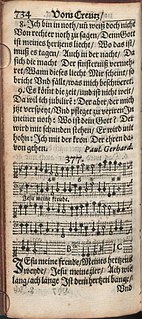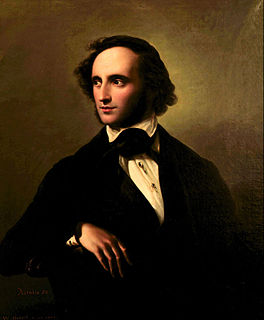Related Research Articles

Christoph Graupner was a German composer and harpsichordist of late Baroque music who was a contemporary of Johann Sebastian Bach, Georg Philipp Telemann and George Frideric Handel.

St. Paul, Op. 36, is an oratorio by Felix Mendelssohn. The composer oversaw versions and performances in both German and English within months of completing the music in early 1836.

August Joseph Norbert Burgmüller was a German composer.

Musikalische Exequien, Op. 7, SWV 279–281 is a sacred composition that Heinrich Schütz wrote in 1635 or 1636. Written for the funeral services of Count Henry II, Count of Reuss-Gera, who had died on 3 December 1635, it is Schütz's most famous work of funeral music. It comprises the following sections:
Roland Wilson is a British cornett player, and conductor based in Germany.
Marcus Ullmann is a German classical tenor.
Werner Güra is a German classical tenor in opera, concert and Lied, also an academic teacher in Zurich.
Elisabeth Scholl is a German soprano and academic teacher.

Hans-Christoph Rademann is a German choral conductor, currently the director of the Dresdner Kammerchor and the Internationale Bachakademie Stuttgart.

Frieder Bernius is a German conductor, the founder and director of the chamber choir Kammerchor Stuttgart, founded in 1968. They became leaders for historically informed performances. He founded the Stuttgart festival of Baroque music, "Internationale Festtage Alter Musik", in 1987, and is a recipient of the Edison Award (1990), Diapason d'Or (1990) and the Order of Merit of the Federal Republic of Germany (1993).
Benoît Haller is a French conductor and tenor, born in Strasbourg in 1972.

Johann Sebastian Bach composed the church cantata Wohl dem, der sich auf seinen Gott, BWV 139, in Leipzig for the 23rd Sunday after Trinity and first performed it on 12 November 1724. The chorale cantata is based on the hymn by Johann Christoph Rube (1692).
Auf, schmetternde Töne der muntern Trompeten, BWV 207.2, is a secular cantata composed by Johann Sebastian Bach and likely premiered in 1735. It utilizes the music from the third movement of the Brandenburg Concerto No. 1 in F major.

"Jesu, meine Freude" is a hymn in German, written by Johann Franck in 1650, with a melody, Zahn No. 8032, by Johann Crüger. The song first appeared in Crüger's hymnal Praxis pietatis melica in 1653. The text addresses Jesus as joy and support, versus enemies and the vanity of existence. The poetry is bar form, with irregular lines from 5 to 8 syllables. The melody repeats the first line as the last, framing each of the six stanzas.

Lazarus or Die Feier der Auferstehung, D 689, is an unfinished 1820 oratorio by Franz Schubert on a libretto by August Hermann Niemeyer. Intended to be in three acts, only act 1 with twenty-one numbers, and eight numbers from act 2 are extant.

Jauchzet dem Herrn, alle Welt, WoO. 28, is an anthem for choir a cappella, a setting of Psalm 100 in German composed by Felix Mendelssohn in 1844. It was published in 1855 after the composer's death. It is the most popular setting of Psalm 100 by Mendelssohn, who also wrote a four-part motet in Latin, "Jubilate Deo", as part of Three Motets, Op. 69, in 1847 for use in the Church of England, which adds a doxology to the psalm text. He set the psalm again, but with paraphrased text by Ambrosius Lobwasser, "Ihr Völker auf der Erde all", as part of Sieben Psalmen, harmonising melodies from the Genevan Psalter.
Miriam Feuersinger is an Austrian soprano.
Christoph Graupner composed the Passion cantata Das Leiden Jesu von seinen Freunden, GWV 1122/41, in Darmstadt in 1741, for Oculi Sunday. It is based on a libretto by Johann Conrad Lichtenberg who wrote a cycle of reflective cantatas for the seven Sundays in Lent of that year, with this cantata focused on Jesus being betrayed and denied by his friends. The cantata is structured in seven movements, a Biblical dictum, a sequence of alternating recitatives and arias, and a closing chorale fantasia. It is scored for four voices, strings and continuo.

Georg Philipp Telemann composed the motet Ein feste Burg ist unser Gott, TWV 8:7, setting Luther's hymn in German, "Ein feste Burg ist unser Gott", for a four-part choir and continuo. The motet was first published around 1780. A modern edition was published by Carus-Verlag.
References
- 1 2 3 "Andrea Lauren Brown / Biographie". konzertwinter.de (in German). 2012. Retrieved 8 May 2020.